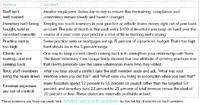Resource list: Fixing a low veterinary practice valuation
Put these tools to work and start tweaking your veterinary hospital for a successful sale.
Maybe you don't like your practice. Or you want a change of scenery. Perhaps you've decided practice ownership isn't for you. Or, better yet, you've just landed a better job offer—or a better practice to own somewhere else. There are many reasons you might be ready to sell your practice, but there's one number that can bring your plans to a screeching halt.
"You've been working hard and thought you were going to get a $1 million payout, but maybe the practice valuation is just a fraction of that price," says Dr. Dave Nicol, veterinary surgeon and veterinary business consultant in Sydney, Australia. Talk about devastating—but all hope is not lost. Dr. Nicol says if you can stick it out for another year or two—maybe hire a consultant—you'll see there are improvements you can start implementing right away to improve the value of your veterinary practice.

What buyers want
"Don't make any big investments, don't hire extra staff if you can avoid it, and maintain your practice in a really lean fashion, so you can make the biggest amount of net profit," Dr. Nicol says.
Uncover the practice problems
First, you need to identify what needs fixing. A number of factors cause a drop in practice value, says Dr. Jim Guenther, MBA, MHA, CVPM, AVA, a Veterinary Economics Editorial Advisory Board member and owner and president of Strategic Veterinary Consulting in Asheville, N.C. He says in some cases it's one big problem that's relatively simple to spot. In other cases, there are lots of issues, but you'll need to zero in on the biggest influencers. For some of Dr. Guenther's most common practice valuation devaluers and resources to get your practice back on track, see the chart below.

Dr. Guenther says you should start asking questions of the person who conducted your practice evaluation—for example, "Where do you think our practice is coming up short?" If he or she says it's not in his or her area of expertise, Dr. Guenther says you need to get a veterinary practice consultant. He says it's also a smart idea to use Benchmarks: A Study of Well-Managed Practices by Veterinary Economics and Wutchiett Tumblin and Associates to see how your practice stacks up against the best of the best and borrow ideas from successful owners.
Catch the right buyer
After you've cleaned up your practice and the valuation is closer to where you want it to be, then it's time to find the right buyer. Dr. Guenther says in today's economy this shouldn't take long. Of course, it's ideal if you've groomed an associate to takeover (check out dvm360.com/associates for the best way to do this). If not, he says sometimes all it takes is word-of-mouth or finding a broker to represent your veterinary practice.
"There are a lot of veterinarians who need a job and they're willing to take a gamble on owning a practice," Dr. Guenther says. "A couple years ago there was a veterinarian new to Asheville who was knocking on every practice's door and asking, 'Will you sell your practice?' It does happen."
The negotiation
Once the buyers are (hopefully) champing at the bit, you're ready to start the negotiation process. Dr. Nicol says to be prepared, it could get heated: You're trying to get one number for your practice, and the prospective buyers are trying to get another number, he says.
He says this would be the time to hire somebody to fight in your corner. Snag the specialists and brokers—they know the market, they sell veterinary practices day in, day out.
"It's hard to sell something you've invested all of your time in. You're completely subjective—you're not going to be that comfortable selling it," Dr. Nicol says. "This is potentially the biggest sale you'll ever make."
That's why you should keep these tools handy for smooth selling from start to finish.